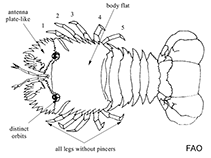Scyllarides roggeveeni Holthuis, 1967
Easter Island slipper lobsterGoogle image | No image available for this species;
drawing shows typical species in Scyllaridae.
Classification / Names Common names | Synonyms | CoL | ITIS | WoRMS
Malacostraca | Decapoda | Scyllaridae
Environment: milieu / climate zone / depth range / distribution range Ecology
Benthic. Subtropical; 25°S - 29°S, 110°W - 107°W (Ref. 4)
Distribution Countries | FAO areas | Ecosystems | Occurrences | Introductions
Southeast Pacific: Endemic to Easter Island.
Length at first maturity / Size / Weight / Age
Maturity: Lm ? range ? - ? cmCommon length : 30.0 cm male/unsexed; (Ref. )
Life cycle and mating behavior Maturity | Reproduction | Spawning | Eggs | Fecundity | Larvae
Main reference
References | Coordinator | Collaborators
Holthuis, L.B. 1991 FAO Species Catalogue. Vol. 13. Marine lobsters of the world. An annotated and illustrated catalogue of species of interest to fisheries known to date. FAO Fish. Synop. 125(13):292p. Rome: FAO. (Ref. 4)
IUCN Red List Status
(Ref. 130435: Version 2025-1)
CITES status (Ref. 108899)
CMS (Ref. 116361)
Threat to humans
Human uses
Fisheries: of no interest
| FishSource |
Tools
More information
Diet composition
Food consumption
Predators
Max. ages / sizes
Length-weight rel.
Length-length rel.
Length-frequencies
Mass conversion
Abundance
Internet sources
BHL | BOLD Systems | CISTI | DiscoverLife | FAO(Publication : search) | Fishipedia | GenBank (genome, nucleotide) | GloBI | Gomexsi | Google Books | Google Scholar | Google | PubMed | Tree of Life | Wikipedia (Go, Search) | Zoological Record



